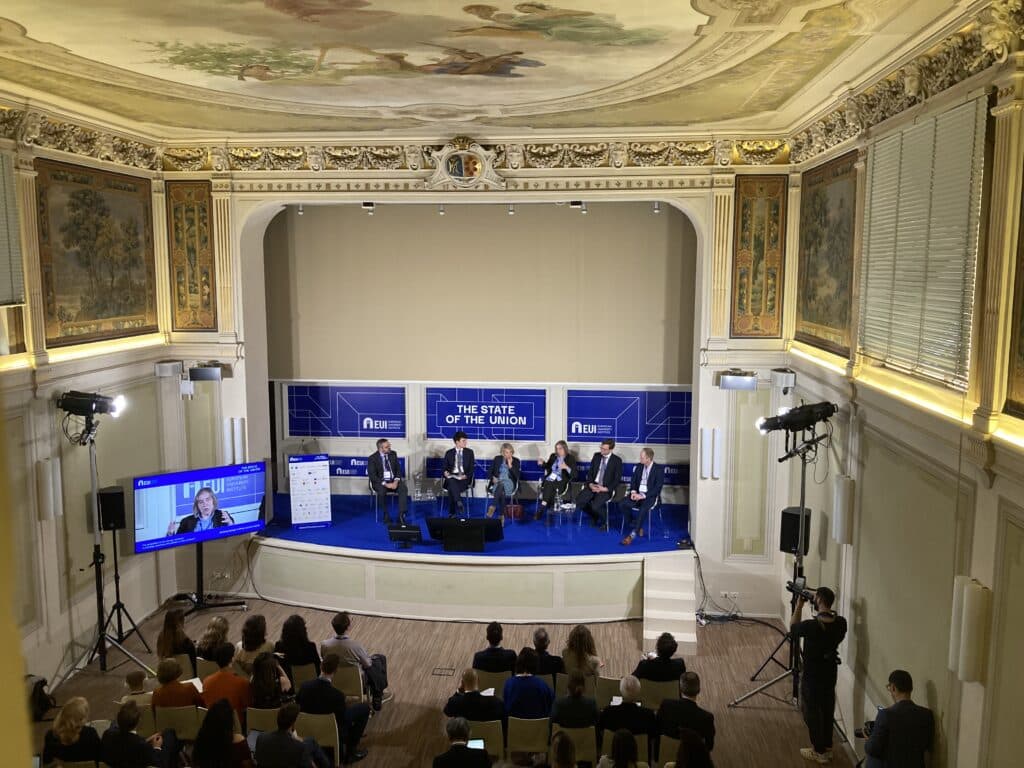The nascent justiciability of energy solidarity
Highlights from the event: Solidarity and Energy Law and Policy: a closer look at the AG ‘s Opinion on the OPAL case
On 20 May 2021, the FSR Energy Union Law Area and the Energy Community Secretariat convened a panel of high-level experts to discuss one of the most significant current developments in EU energy law: the nascent justiciability of energy solidarity. Specifically, this hors série event of the Vienna Forum on European Energy Law discussed the Opinion of Advocate General (AG) Campos Sánchez-Bordona in Case C-848/19 P Germany v Poland, which was delivered on 18 March 2021. Significantly, the AG agreed with the General Court’s judgment in in Case T-883/16 Poland v Commission, which held that energy solidarity under Article 194(1) of the Treaty on the Functioning of the European Union (TFEU) is a justiciable principle of EU primary law. The General Court found that this principle, in combination with Article 36 of Directive 2009/73/EC on Common Rules for the Internal Market in Natural Gas (current consolidated version here), meant that a 2016 decision by the European Commission to approve an increase in the volume of Russian gas that could be transported though the OPAL natural gas pipeline in Germany was in breach of EU law.
Watch the recording:
Dirk Buschle (Energy Community Secretariat; College of Europe) introduced the event. Dr Buschle emphasised the fundamental importance of the matter now before the Court of Justice, saying that the Court will need to decide whether energy solidarity will “ascend from a political commitment to the Mount Olympus of principles with legal relevance in the Treaty”. He stated that the European Green Deal will augment the importance of solidarity, and to a certain extent already contains solidarity considerations when it comes to issues such as burden sharing. However, many questions about energy solidarity still remain open: will it be a duty towards the European Union, similar to that of loyal cooperation? Or will it be an obligation on Member States towards each other? Will solidarity just require another balancing of interests, and whose interests will have to be taken into account? Questions such as these highlight the importance and timeliness of this event.
The stage thus set, Dr Buschle handed over to Leigh Hancher (FSR), who moderated the event. Dr Hancher introduced the panel, composed of Kim Talus (Universities of Tulane, Eastern Finland and Helsinki); Katja Yafimava (Oxford Institute for Energy Studies); and Pawel Pikus (Director of the Electricity and Gas Department in the Ministry of Climate and Environment of the Republic of Poland).
Key Points of the Speakers
Kim Talus was the first speaker to address participants. He emphasised that the original 2009 exemption decision regarding the OPAL pipeline, which had capped the pipeline capacity that could be used by Gazprom, had been declared in breach of WTO rules in EU — Energy Package. Against this background, Prof. Talus said that the General Court judgment contradicted the opinion of solidarity heretofore held by the vast majority of EU energy law experts, including himself, who had regarded solidarity under art 194(2) TFEU as a political principle that serves to guide the legislator, but that was not in itself justiciable. The mainstream expert opinion had also held that solidarity was likely to be only applicable in crisis situations, such as an acute energy supply emergency. The General Court, however, denied this interpretation in its judgment when defining the principle of energy solidarity in paragraph 73 of its judgment, saying that it
requires the European Union and the Member States to endeavour, in the exercise of their powers in the field of energy policy, to avoid adopting measures liable to affect the interests of the European Union and the other Member States, as regards security of supply, its economic and political viability, the diversification of supply or of sources of supply, and to do so in order to take account of their interdependence and de facto solidarity
The principle of energy solidarity is thus of general applicability. However, according to Prof. Talus, a problematic aspect of this finding is precisely that solidarity is not an absolute rule but a principle that requires a balancing exercise between the interests of different Member States and the European Union as a whole. The AG largely agrees with General Court’s approach and states that the relatively abstract nature of energy solidarity means that it is not always clear how it will apply. Significantly, the AG argues for limited judicial review in the basis of the principle of energy solidarity, since the technical expertise lies with the European Commission.
This, according to Prof. Talus, was one of the most problematic aspects of the AG’s Opinion. Uncertainties about the criteria for review on the basis of the energy solidarity principle could lead to it having a “jack-in-the-box” effect, that is it could be invoked unexpectedly and with unpredictable consequences across a broad range of energy law and policy decisions. Further, the limited judicial review proposed by the AG risks infringing the right to effective judicial protection under Article 47 of the EU Charter of Fundamental Rights. In addition, the AG’s Opinion is in conflict with the WTO Panel Report.
According to Prof. Talus, the justiciability of energy solidarity could also entail positive effects, such as a recognition of the increasingly interlinked nature of EU energy markets and strengthening the EU’s ability to “speak with one voice”, particularly regarding gas matters. However, these positive effects could be outweighed by the potential for further transfer of power to the European Commission and resulting reduction of Member States’ energy rights, as well as the abovementioned issues of legal certainty and judicial protection, unless the Court of Justice provides much more detailed guidance on this issue in its judgment.
In her ensuing presentation, Katja Yafimava focused on the practical implication of the AG’s Opinion for the OPAL natural gas pipeline. Dr Yafimava stressed that the General Court’s judgment had, in fact, not had a material impact on the volume of Russian gas entering Europe through the Nord Stream pipeline, since the first string of the EUGAL pipeline had been used to compensate for the reduced volume of gas that could be transported through OPAL. The completion of the Nord Stream 2 pipeline, of course, would change this situation.
Like Prof. Talus, Dr Yafimava underlined the importance of the Court of Justice defining the criteria of energy solidarity more precisely in its judgment. Neither the General Court nor the AG had provided a methodology for carrying out an impact assessment of the energy solidarity principle. Accepting a limited judicial review as proposed by the AG would give the European Commission significant leeway regarding scope and depth of any such assessment. In Dr Yafimava’s opinion, it would be unacceptable if the Commission were allowed to both define the criteria for the impact assessment and then conduct the assessment, with only limited possibilities of judicial checks. In fact, a failure by the Court of Justice to define the criteria for the assessment would be tantamount to admitting failure to demonstrate that energy solidarity is a legal (as opposed to a political) principle.
Regarding the future of the OPAL pipeline more specifically, Dr Yafimava presented three possible paths that the Court of Justice cold take: first, ordering the Commission to revise the 2016 exemption decision; secondly, annulling the 2016 exemption decision; or, thirdly, a restoration of the 2016 exemption decision. Dr Yafimava argued that a revised decision could be a cross between the 2009 and 2016 decisions and could include mechanisms such as a fluctuating cap on capacity.
The third speaker, Pawel Pikus emphasised that while General Court had recognised the legal importance of the principle of energy solidarity in 2019, it had always been Poland’s view that with its inclusion in the Lisbon Treaty, the principle had acquired legal significance. Before then, according to Dr Pikus, energy solidarity had been of significant political importance, particularly in the aftermath of the 1970s oil crisis, which had led to a securitisation of energy policy in the EU. The gas supply crises of 2006 and 2009, then, prompted the inclusion of the principle in the TFEU. In Dr Pikus’ opinion, energy solidarity could be seen as a specific manifestation of the principle of sincere cooperation, which had gained constitutional status with the Lisbon Treaty.
Dr Pikus argued that energy solidarity applies to objectives of EU energy policy. Thus, to him, the interpretative dilemma pointed to by some energy law experts seemed an empty discussion, since it was always clear that energy solidarity is a constitutional principle with a remit that goes beyond security of supply emergencies. Thus, Dr Pikus also stressed the importance of basing the EU’s Just Transition to a decarbonised energy system on the principle of solidarity, which in this context would mandate that the specific (economic) circumstances of each Member State are taken into account when deciding how to achieve the EU’s ambitious climate targets. Dr Pikus concluded by quoting Jacques Delors: “solidarity is based not on generosity but on the Member States’ ‘enlightened self-interest'”.
Q&A Session
A lively Q & A session followed the panellists’ individual presentations. Among other issues, this provided an opportunity for speakers to comment on the future of the exemption procedure under Article 36 of Directive 2009/73/EC. Kim Talus said that a decision by the Court of Justice recognising the justiciability of energy solidarity could have a negative effect on the exemption procedure, since it would introduce an element of uncertainty into the quite clear-cut conditions of Article 36. Dirk Buschle stated that in his opinion, the exemption criteria under Article 36 are currently not that precise and actually overlap with aspects of the solidarity principle. The main challenge would thus consist in incorporating a meaningful solidarity criterion into Article 36 while not duplicating tests that already have to be performed under other criteria. Katja Yafimava stated that if a solidarity impact assessment were to form part of the exemption procedure in the future, this would render (even) less transparent and more discretionary the exemption process for any new pipeline and particularly for the German section of Nord Stream 2 (should such an exemption be sought). Dr Pikus stated that in his opinion, the addition of a solidarity requirement would not make the exemption procedure significantly more difficult and pointed to the option of having recourse to the courts in case of a disputed exemption decision on the basis of solidarity. In fact, Dr Pikus stated that a solidarity requirement for exemption decisions would give clearer and more transparent signals to the energy market.






